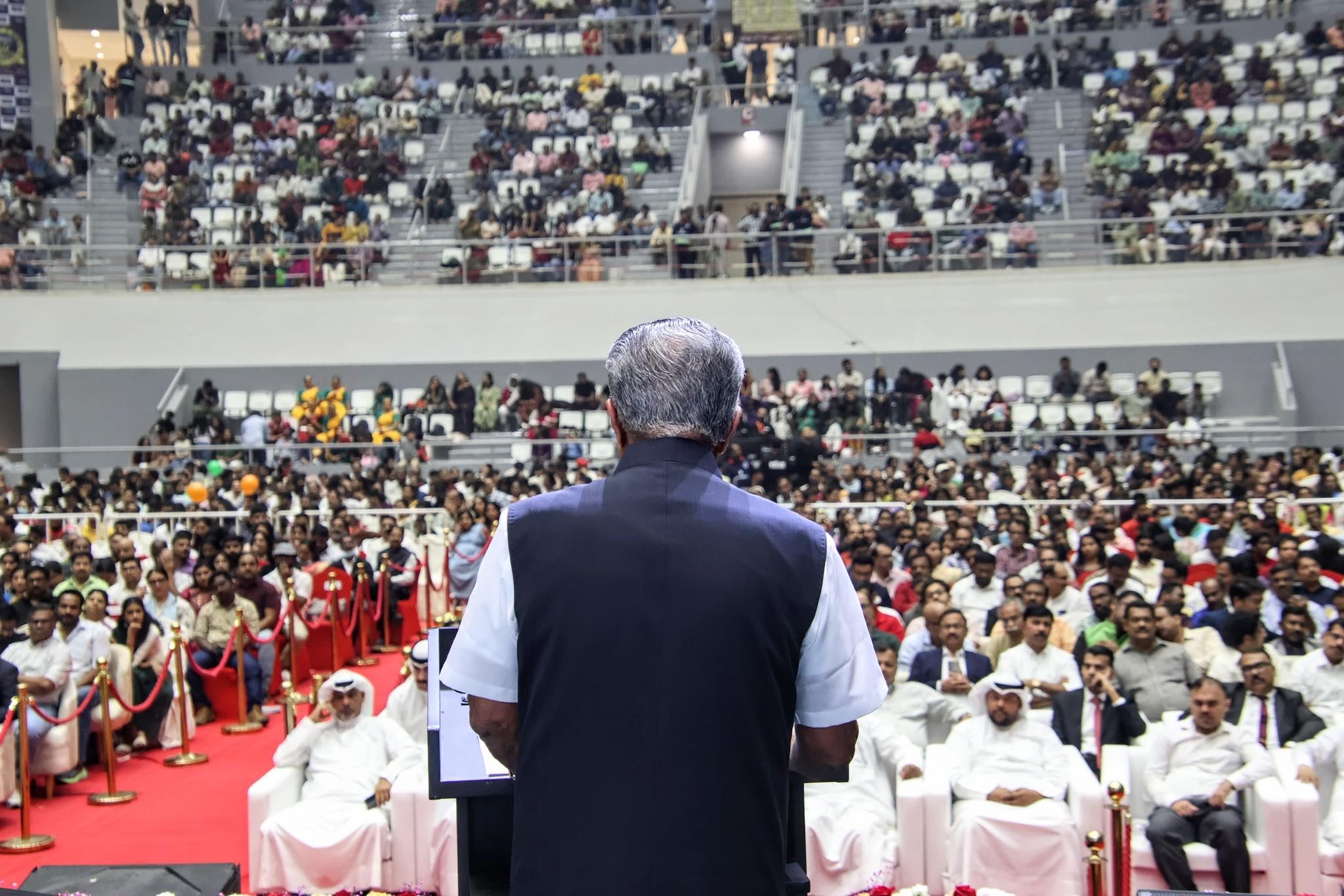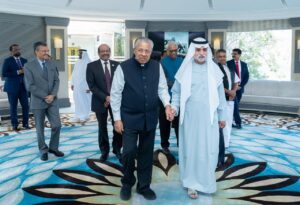While the chief minister's outreach emphasises Kerala’s gratitude to expatriates for their remittances and resilience, the Assembly committee’s findings highlight the disconnect between promises and practice.
Published Nov 13, 2025 | 5:08 PM ⚊ Updated Nov 13, 2025 | 5:08 PM

Chief Minister Pinarayi Vijayan addressing the expatriate community in Kuwait
Synopsis: A report tabled by the Kerala Legislative Assembly’s Committee on the Welfare of Non-Resident Keralites questioned whether the state truly met its promises to those who returned home after losing their jobs abroad during and after the Covid-19 pandemic. The panel questions whether the state’s words of gratitude have translated into tangible action for those who returned home during the crisis.
A report tabled by the Kerala Legislative Assembly’s Committee on the Welfare of Non-Resident Keralites raises an uncomfortable question: Has the state truly met its promises to those who returned home after losing their jobs abroad during and after the Covid-19 pandemic?
The report came at a time when Chief Minister Pinarayi Vijayan toured Bahrain, Oman, Qatar, and the UAE, reaching out to the Malayali diaspora with assurances of welfare and inclusive growth.
The committee, chaired by AC Moideen, paints a sobering picture of partial implementation, inadequate awareness, and bureaucratic inertia surrounding several government schemes designed to rehabilitate returnee expatriates.
While acknowledging the “invaluable contributions” of Malayalis abroad to Kerala’s social and economic fabric, the panel questions whether the state’s words of gratitude have translated into tangible action for those who returned home during the crisis.
The report comes two years after Kerala announced a slew of rehabilitation measures for returnees following the Covid-induced exodus from Gulf countries.
At the heart of the committee’s scrutiny is the NORKA Department Project for Returned Emigrants (NDPREM) — the government’s flagship rehabilitation initiative that aims to provide entrepreneurial loans of up to ₹30 lakhs to non-resident Keralites who have worked abroad for more than two years and have settled in the country, to start self-employment or enterprises and to expand existing ones.
The scheme provides entrepreneurs with 15 percent capital subsidy (up to a maximum of ₹3 lakhs) and three percent interest subsidy (for the first four years) for timely loan repayment.
While the scheme’s intent was lauded, the committee found that information about it did not effectively reach many returnees, resulting in underutilisation.
“The schemes have not been fully utilised and there are many problems in coordination, control and implementation,” the report noted.
Even though Kerala Bank and 17 other financial institutions have partnered with the project, many cooperative banks remain outside its ambit, limiting access in rural areas.
The panel recommended including all cooperative banks in the state to widen the scheme’s reach.
Expatriate organisations, during evidence-gathering sessions, flagged negative attitudes from bank branches — particularly concerning the rejection of applications over CIBIL scores and doubts about market feasibility.
The committee observed that such issues were symptomatic of a deeper coordination gap between NORKA, the implementing agency, and financial institutions.
It recommended that all cooperative banks in the state be brought under the NDPREM umbrella, and that market feasibility and applicant eligibility be examined at the very start to prevent arbitrary rejections.
“The schemes are well-intentioned, but the awareness and accessibility remain limited,” the report said, adding that many returnees “have no knowledge” of the government’s rehabilitation programs and thus fail to avail themselves of the benefits.
Several other financial aid schemes designed for returnee Malayalis — such as KB Pravasi Kiran, KB Pravasi Bhadratha, and Pravasi Bhadratha–Pearl — were also reviewed by the committee.
The ‘KB Pravasi Kiran’ scheme of Kerala Bank, designed to provide capital and interest subsidies to expatriates who lost jobs during Covid, has disbursed about ₹71 crore to 406 beneficiaries since 2022–23.
Another Kerala Bank initiative, ‘KB Pravasi Bhadratha’, offers up to ₹5 lakh to help restart small ventures, with ₹75 crore lent to 96 expatriates last fiscal year. An oversight committee has been established to monitor the program, but representatives said implementation lags persist.
Similarly, ‘Pravasi Bhadratha–Pearl’, launched through Kudumbashree in 2021, aimed to help low-income Keralites and their families attain self-reliance through interest-free loans up to ₹2 lakh.
However, concerns about transparency in beneficiary selection and the limited quantum of assistance were raised. The committee recommended doubling the loan amount and turning the financial aid into a revolving fund to ensure continuity.
Similarly, the Pravasi Bhadratha–Micro scheme, providing self-employment loans via Kerala Bank and KSFE, has disbursed ₹377.95 crore.
Yet, the committee advised the government to devise better investment instruments with higher interest rates for expatriate chits and savings schemes, arguing that financial empowerment should not stop at micro-credit.
Another flagship programme, the Pravasi Mega Scheme implemented by NORKA Roots and KSIDC, provides interest subsidies on loans between ₹25 lakh and ₹2 crore.
However, the report reveals that many returnees are unaware of its existence, leading to poor uptake.
The committee has now called for special awareness campaigns among expatriate groups and associations to ensure that the benefits reach their intended recipients.
Beyond financial rehabilitation, the committee flagged the NORKA Institute of Foreign Languages in Thiruvananthapuram — currently offering training in German and English — as a missed opportunity. Since a majority of Malayalis work in Gulf nations, the report urged Arabic language training to be included in its curriculum.
It also called for strengthening the ‘Shubha Yatra’ scheme, under which candidates receive up to ₹2 lakh in loans for foreign language and regulatory exam preparation. The committee recommended an interest subsidy on these loans to make them more accessible.
The committee also highlighted systemic gaps in local self-government (LSG) involvement in expatriate rehabilitation. Although the government has issued guidelines urging panchayats and municipalities to prioritise expatriates in their development plans, implementation remains inconsistent.
To address this, the panel recommended:
The report urged the government to explore a MEDISEP-like insurance scheme for expatriates by collecting a one-time annual premium to ensure health and life protection.
It also recommended increasing compensation under the NORKA Accident and Death Assistance scheme, currently ₹4 lakh for accidental death and ₹2 lakh for permanent disability — amounts that have remained static despite rising repatriation and healthcare costs.
Significantly, the panel proposed enrolling expatriates in the National Pension Stream while they are still abroad, in collaboration with Malayali associations — a move that could provide long-term security to returning workers.
In its concluding section, the panel made a bold pitch: Kerala should establish a ‘Pravasi Mission’ on the Kudumbashree model — a decentralised, mission-driven framework to ensure continuous engagement, rehabilitation, and reintegration of expatriates and returnees.
However, the committee also voiced concern over the financial health of the Kerala Non-Resident Welfare Board, citing delays in the government’s share for the Pravasi Dividend Scheme, which has forced the Board to divert funds from other programmes.
The panel called for the timely disbursal of the state’s contribution to sustain welfare and dividend initiatives.
At the same time, NORKA officials pointed out that Kerala has strengthened its commitment to the expatriate community by rolling out a series of pioneering initiatives, reaffirming its unique approach of treating Non-Resident Keralites (NRKs) as a distinct social category.
They also pointed out that Kerala remains the only state in India implementing dedicated schemes for expatriates.
Commenting on the NDPREM, they stated that 17 financial institutions are currently partnering with returning expatriates to support them in their reintegration into the state’s economy.

Chief Minister Pinarayi Vijayan with Sheikh Nahyan bin Mubarak Al Nahyan, Minister of Tolerance and Coexistence, UAE
The scheme will soon expand further with the inclusion of more financial institutions, they added.
At the same time, the Economic Review 2024 highlights that the NDPREM scheme has 1,200 beneficiaries in the financial year 2023-24, and an amount of ₹18 crore has been expended through this scheme during the year 2023-24.
More than 6,600 enterprises were started through this scheme.
Marking another milestone, the state launched NORKA CARE on 1 November — a first-of-its-kind comprehensive health and accident insurance scheme for expatriates and their families.
Over one lakh families have already enrolled, providing coverage to nearly four lakh individuals.
The plan offers ₹5 lakh in health insurance and ₹10 lakh in accident insurance for a family of four, at a premium of ₹13,411, ensuring cashless treatment through 18,000 hospitals across India, including over 500 in Kerala.
Furthering its diaspora engagement, the government has also decided to constitute a Pravasi Mission under the NORKA Department.
Announced by Chief Minister Pinarayi Vijayan in the Assembly on 30 September, the ₹2-crore initiative aims to coordinate rehabilitation, financial reintegration, and investment facilitation for returning expatriates, making Kerala a model for diaspora welfare and inclusive reintegration.
While the chief minister’s outreach emphasises Kerala’s gratitude to expatriates for their remittances and resilience, the Assembly committee’s findings highlight the disconnect between promises and practice.
“Kerala owes much to its expatriates,” the report reminds. But behind the ceremonial speeches and overseas receptions lies an uncomfortable truth: thousands of returnees, who once fueled the state’s economy from afar, now struggle to rebuild their lives at home — caught between bureaucratic roadblocks, lack of awareness, and slow-moving welfare machinery.
The Committee’s message is clear — if Kerala’s welfare narrative for its expatriates is to move from rhetoric to reality, it must begin by keeping its word to those who came back when the world shut its doors.
As the report concludes, “The problems faced by expatriates, who play a crucial role in Kerala’s economy, deserve utmost importance. This report should serve as an impetus for formulating schemes that enhance their welfare and prosperity.”
(Edited by Muhammed Fazil.)
